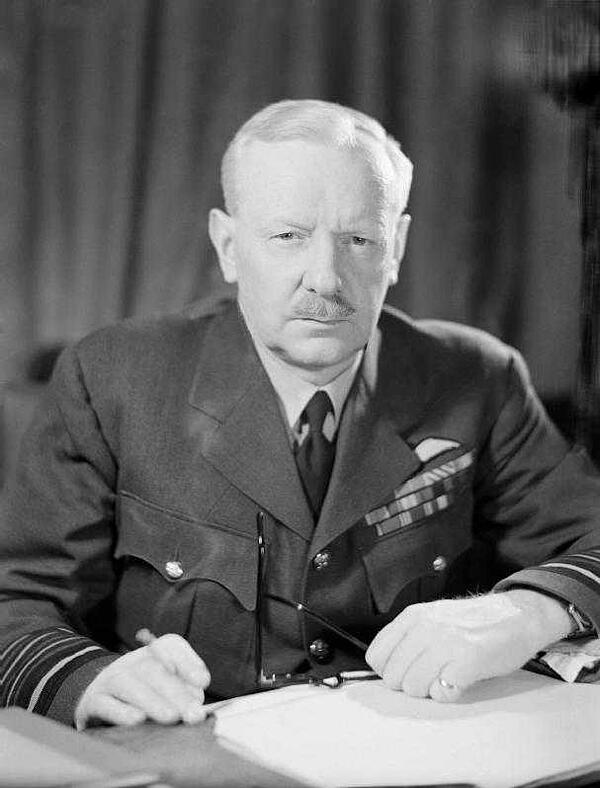Air Marshal Arthur Harris
Air Marshall Arthur Harris was Air Officer Commanding-in-Chief in RAF Bomber Command during the second half of World War Two As commander of Bomber Command, Harris ordered his pilots to bomb civilian targets on a huge scale. He also ordered the aerial attacks on Dresden in February 1952 which left the city in ruins.
Born in April 1892, Harris moved to Rhodesia when he was 17 to try his hand at mining gold and growing tobacco.
At the outbreak of World War One, Harris signed up with the 1st Rhodesia Regiment. and first saw action in Southern Africa where he helped take on German forces.
In 1915 Harris went back to Britain. He became part of the Royal Flying Corps and in 1916 became a qualified fighter pilot, at which time he went to France where he joined up with the 44 Squadron. During this time he witnessed the ineffectiveness of trench warfare - it was slow and difficult to make progress. It was reportedly this that is thought to have encouraged his belief in aerial bombing. By the end of the war, he was in charge of 44 Squadron.

Harris became an RAF squadron leader in 1919. He served all through the British Empire - including across the Middle East and in India, Iraq, Iran and the Middle East - during the 1920s and early 1930s. At that period, the air force was using bombing raids to oppose rebelling tribes in Iraq. To the horror of many RAF personnel, more extreme weapons were also being used in some of these raids, including delayed action bombs and poison gas. Some senior military figures, such as Air Commodore Lionel Charlton, were so shocked by this that they resigned from their positions. But Harris was unrepentant, claiming that he had no other option but to carry out the bombing raids.
Harris was made Deputy Director of Plans in the Air Ministry in 1933, and he served in this role for four years. As relations with the Germans soured through the 1930s, Harris was already looking forward to the potential potential role that the air force could play if another war broke out - he put together a document outlining his findings.
Harris was made an Air Vice Marshall by September 1939. In the opening stages of the war he worked in America purchasing planes to help with Britain's effort in the war. Harris was then made head of Bomber Command in February 1942. Up to this point, this section of the air force had not enjoyed much success: its day-time raids had resulted in heavy casualties while the night-time attacks had been largely inaccurate.
Since he was Bomber Command’s commander, Harris promoted 'area bombing'. Harris held the belief that German morale would be severely damaged if cities were bombed. The German people would then inflict the government with pressure to surrender.
To begin with, raids targeted Lubeck and Rostock - incendiary bombs were dropped and the cities were greatly damaged. In May 1942, a vast bombing raid on Cologne severely damaged the city. Only 40 planes were lost.
Huge bombing raids carried on over cities like Hamburg and Berlin, and resulted in the well known Dresden raid in February 1945, in which large parts of the city were razed and approximately 20,000 civilians killed. More than 600,000 German civilians were killed in the raids and 6 million homes were severely damaged. The raids also presented bomber crews with a high amount of danger: throughout the war, Bomber Command experienced the loss of more than 57,000 men and a lot of aircraft such as the Lancaster bomber. Over 600,000 German civilians and destroyed a total of six million homes.
In the beginning, Winston Churchill gave his support to Harris. In 1941 he had said that the Germans should be forced into submission through any means possible.
However, Churchill gave Harris instructions in 1945 that the area bombing of Germany should come to a halt.
“The destruction of Dresden remains a serious query against the conduct of Allied bombing.”
Harris was made the RAF Marshal in 1946, but felt Bomber Command did not receive the recognition that it deserved (in his opinion). Harris was greatly angered when Bomber Command pilots were not awarded campaign medals when the war was over.
Many people have questioned the morality of Bomber Command’s area bombing strategy, which indiscriminately targeted civilians. Within 24 hours of the unveiling of a statue of Harris near Trafalgar Square in 1992, it was splattered with blood red paint . Unsurprisingly, Harris trenchantly defended his tactics. In his memoirs, he even claimed that bombing ‘proved a comparatively humane method’ because it saved ‘the youth of this country and of our allies from being mowed down by the military as it was in the war of 1914-1918’.
Soon after Harris’s promotion to Marshall, he retired from the RAF and emigrated to South Africa. Arthur Harris passed away on 5 April 1984.
"In spite of all that happened at Hamburg, bombing proved a comparatively humane method. For one thing, it saved the youth of this country and of our allies from being mown down by the military as it was in the war of 1914-1918."
(A quote from Arthur Harris’s 947 memoirs)
See also: Erich Hoepner
MLA Citation/Reference
"Air Marshal Arthur Harris". HistoryLearning.com. 2025. Web.
